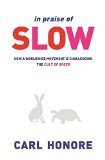
Slow down? Manana….
Carl Honore, In praise of slow, Blackberry, Canberra, downshifting, slowing down, dropping out, Orion,

Carl Honore, In praise of slow, Blackberry, Canberra, downshifting, slowing down, dropping out, Orion,
Now retrieving the rating.
$192.98 (as of April 26, 2024 14:01 GMT +01:00 - More infoProduct prices and availability are accurate as of the date/time indicated and are subject to change. Any price and availability information displayed on [relevant Amazon Site(s), as applicable] at the time of purchase will apply to the purchase of this product.)Now retrieving the rating.
31% OffNow retrieving the rating.
$98.99 (as of April 26, 2024 14:01 GMT +01:00 - More infoProduct prices and availability are accurate as of the date/time indicated and are subject to change. Any price and availability information displayed on [relevant Amazon Site(s), as applicable] at the time of purchase will apply to the purchase of this product.)Now retrieving the rating.
$9.99 (as of April 26, 2024 14:01 GMT +01:00 - More infoProduct prices and availability are accurate as of the date/time indicated and are subject to change. Any price and availability information displayed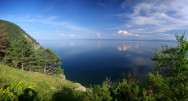
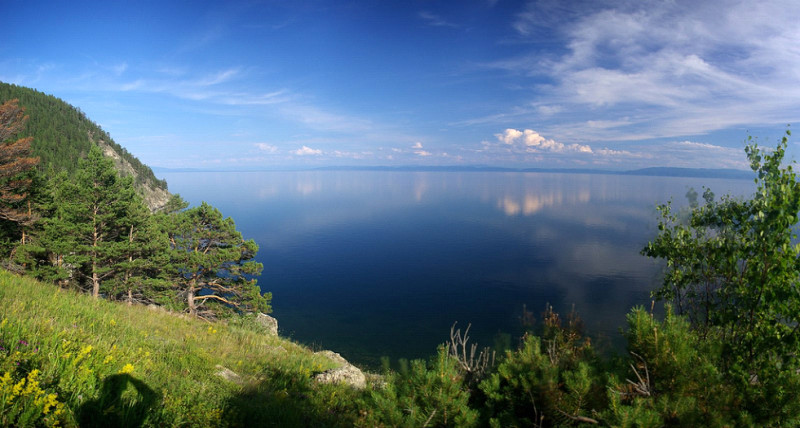 In 2011, Sylvain Tesson left his home in Paris for a 6 month stay, on his own, on the edge of Lake Baikal. He stayed in an old geologist’s hut that was heated by a cast-iron stove and attempted to lead a “simple life and claim back time”.
In 2011, Sylvain Tesson left his home in Paris for a 6 month stay, on his own, on the edge of Lake Baikal. He stayed in an old geologist’s hut that was heated by a cast-iron stove and attempted to lead a “simple life and claim back time”.
Lake Baikal in Siberia is the largest freshwater lake by volume in the world and contains nearly 20% of the world’s unfrozen surface freshwater. The lake is a Unesco World Heritage Site and is 395 miles long, 49 miles wide, 1,642m (just over a mile) deep, and 25 million years old. In fact, the lake is so huge that the surface area is as large as Belgium and, at normal walking speed, it would take you 4 months to walk all the way around it.
Off-grid living has the potential to become one of the most amazing experiences or life changing moments in one’s existence. However, if the destination is Lake Baikal, the chips are stacked against you. It is not the extreme environment or the wild and fierce creatures lurking in the dense wood that you will succumb to. It will be the extreme solitude, isolation and loneliness. One must mentally prepare for the marked change from the abundance of faces around you in the city, to the only face for miles and miles is that of your own reflection in the shimmering water.
https://www.theguardian.com/travel/2013/may/31/siberia-cabin-lake-baikal-russia. He was driven there by truck in February when the temperature was -30 degrees Celsius and the ice was a metre thick. It was a 6 day walk to the nearest village and a day’s walk to the nearest neighbour. His equipment included: “an axe and cleaver, fishing poles, kerosene lamp, ice drill, saw, snowshoes, tent, liquor glasses and vodka, cigars, provisions (pasta, rice, Tabasco sauce, coffee) and a library of almost 80 books”. Although his time in the Taiga was an experiment and not a complete emigration, Tesson still needed to account for and appreciate the enormity of the solitude he was facing out there.
“Cabin Fever” is an expression for a reason. Cooped up, alone in a hut for days on end can send someone into a spiral of depression. Tessson said that the pain derives from, “the sorrow of not sharing with a loved one the beauty of lived moments” and also “what others miss out on by not being with the person who experiences it”. Routine and remaining occupied are two ways to combat loneliness.
Tesson was warned prior to leaving Paris that boredom would become his worst enemy. He therefore decided to immerse himself in literature. With a library around him, he suddenly had an abundance of friends and stories to be listened to. His collection extended from philosophy and poetry, through to nature books, non-fiction and fiction. DH Lawrence would stir his senses. Nietzche and Schopenhauer would keep his mind …
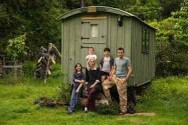
Tobias Jones is a co-founder of Windsor Hill Wood community in Somerset. His book about his community, Buy “A Place of Refuge” from Amazon UK, is published by Quercus.
In this extract he talks about why off-grid living is better in a community.
BY TOBIAS JONES
We set up our community, Windsor Hill Wood, six years ago in a ten-acre woodland in Somerset, UK. The sole purpose was to offer sanctuary to those in a period of crisis in their lives: those struggling with addiction, depression, bereavement, homelessness, eating disorders, PTSD, and so on. In that time we’ve had well over a hundred people living in our family home, and the benefits – both to ourselves and to our guests – have far outweighed the drawbacks. It’s just a natural, healthy, wholesome way to live.
Yet in all functioning communities, collective choices are made and have to be adhered to. One of the most fascinating communal experiments that emerged from the hippie movement in the US was The Farm, in Tennessee. Inspired by the late Stephen Gaskin, it began in 1971, as you might expect, as a mirror-image of that age’s free-for-all attitude, but slowly began to incorporate “agreements”, which, over the years, made it a very stable and yet very creative space. Communal choices were made to respect the sanctity of marriage and monogamy, to avoid the use of hard drugs, and so on.
But the greatest obstacle to sharing the lessons of communalism is our warped notion of freedom. The essayist Wendell Berry arrived at the heart of the problem in his 2002 book, The Art of the Commonplace:
. . . there are two kinds of freedom: the freedom of the community and the freedom of the individual. The freedom of the community is the more fundamental and the more complex. A community confers on its members the freedoms implicit in familiarity, mutual respect, mutual affection, and mutual help; it gives freedom its proper aims . . . The freedom of the individual, by contrast, has been construed customarily as a license to pursue any legal self-interest . . .”
It is here that, most clearly, a contemporary observer will glimpse the scary needle that administers the medicine we need: to create any sort of community, we need to pool individual freedoms to gain community freedoms. The latter emerge only through submission and obedience, not through exuberance and incessant self-expression. It is, obviously, a hard sell.
It is hard to find a word held so low in the public esteem as “communalism”. For most people it carries a toxic whiff of both “communism” and “commune”, implying dropouts, flakes, fanatics and cultish leaders. If you’re in any doubt about how frightening the word is to the average citizen, try telling your next-door neighbour you’re going to live communally: they will veer away from you (believe me, I’ve …
CNN devoted an hour to one of the hero’s of off-grid living, Graham Hill. The TV Channel visited his place on the Hawaiian island of Maui’s north shore. (Our thanks to Claudia Rothschild for making the edited transcript)
“My vision is to try to create a fully off-grid, luxurious, sustainable way of living that doesn’t cost too much, and then try to get friends and maybe even make it a bed and breakfast and have people come through and understand how incredible it could be to live off-grid,” said Hill.
“Off-Grid means you have a water catchment, there is enough rain that you can get all your water from the sky. Solar and wind are really good on Maui, so basically, make it entirely energy independent.
Because I design my life virtually, I am able to work from anywhere. So when it is freezing cold in New York, I am able to come here for two or three months and work from here. So it is a fantastic setup.
Now retrieving the rating.
$192.98 (as of April 26, 2024 14:01 GMT +01:00 - More infoProduct prices and availability are accurate as of the date/time indicated and are subject to change. Any price and availability information displayed on [relevant Amazon Site(s), as applicable] at the time of purchase will apply to the purchase of this product.)Now retrieving the rating.
31% OffThe slow-walking mindless undead of many a horror film may figure in our nightmares, but increasingly we experience the zombie walk in our working lives as well. Maybe you are one of the millions working in businesses that have accrued so much debt since the recession began, that they have little prospect of ever being able to repay it.
The directors of these businesses, and their employees, continue working each day with no end to the misery in sight – thanks to government help, ultra-loose monetary policy and, often, the reluctance of lenders to write down bad loans since the crisis.
The belief is spreading that these firms – which spend their cash servicing interest payments are unable to invest in new equipment or future growth areas – are to blame for the weak recovery,
Now retrieving the rating.
$192.98 (as of April 26, 2024 14:01 GMT +01:00 - More infoProduct prices and availability are accurate as of the date/time indicated and are subject to change. Any price and availability information displayed on [relevant Amazon Site(s), as applicable] at the time of purchase will apply to the purchase of this product.)Now retrieving the rating.
31% OffNow retrieving the rating.
$98.99 (as of April 26, 2024 14:01 GMT +01:00 - More infoProduct prices and availability are accurate as of the date/time indicated and are subject to change. Any price and availability information displayed on [relevant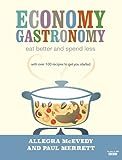
Slow cooking is the best way to eat off the grid. Here is the philosophy for successful slow stews.
It’s an icy winter’s day in west London and Allegra McEvedy’s kitchen is filled with spice-fragrant steam. As she stirs a huge pan of gumbo, a richly flavoured sausage and prawn casserole, McEvedy, who recently starred in the BBC TV series Economy Gastronomy (buy the book in the US) , becomes increasingly evangelical. “The recession was the kick up the backside that people needed to eat better and waste less,” she says.
Now retrieving the rating.
$192.98 (as of April 26, 2024 14:01 GMT +01:00 - More infoProduct prices and availability are accurate as of the date/time indicated and are subject to change. Any price and availability information displayed on [relevant Amazon Site(s), as applicable] at the time of purchase will apply to the purchase of this product.)Now retrieving the rating.
31% OffNow retrieving the rating.
$98.99 (as of April 26, 2024 14:01 GMT +01:00 - More infoProduct prices and availability are accurate as of the date/time indicated and are subject to change. Any price and availability information displayed on [relevant Amazon Site(s), as applicable] at the time of purchase will apply to the purchase of this product.)Chapter 9 – Different Strokes (Land Part 2)
Copyright Michael Bunker 2009
Doug’s Story
Doug was up before the sun. He didn’t need an alarm clock. He was so accustomed to waking up at the same time every morning that he knew naturally by the faint light on the horizon and the sounds and smells of the morning that it was time for him to get started. He dressed quickly and headed to the small milk shed to meet Polly, his milk cow. She was waiting for him. He had separated her from her calf the night before, so she was full and very ready to be milked.
After milking he returned Polly to her calf and headed back to his small cabin for breakfast. By this time the sun was up and the morning was fully underway. It was shaping up like another glorious day on his land, Praise God. He needed to go move his small herd of cattle to the newly fenced pasture he had prepared. Doug had created a workable pasture rotation system on his 80 acres. 80 acres is a lot of land for a single man without children, but Doug had every intention of finding a wife and having a family someday, if the Lord were to will it, and he had arranged his property in such a way that it didn’t take as much work as some people might think. He had cows, chickens, some sheep, and a few pigs. He had divided 50 of his acres into ten acre paddocks, so he could keep the animals rotating onto fresh pasture. Ten acres of his land was a woodlot and the rest, what wasn’t used for his cabin, sheds, and gardens, was left in permanent pasture. Whenever necessary, he could turn animals out into this area if he needed to “rest” any other portion of his land.
From his land, Doug was able to produce almost all of the food he needed in order to survive. His garden was a large “truck garden”, where he would produce enough to take a truckload of produce to the farmer’s market every week during the growing months. He also produced enough “overage”, primarily in meat, eggs, and wool, to be able to pay the balance of his land payment to Mr. Polk. Two days a week, Doug worked on Mr. Polk’s ranch, building or tearing down fences, cutting brush, moving cattle, or basically doing any “grunt work” that Mr. Polk required. The arrangement was ideal for both of them. Mr. Polk was getting older, and he really needed a lot of help around his ranch. Doug had gone to work for Mr. Polk several years ago. After he had built up a good relationship with his boss, and had shown him he was a good and diligent worker, Mr. Polk had agreed to sell him 80 …
Chapter 8 Land, Of The Free (Land Part 1)
Copyright Michael Bunker 2009
Land, A Longing in the Heart
I would have loved to talk about land first. After all, we are ôBack to the Landö proponents, arenÆt we? As homesteaders, our lexicon is steeped in the concept of ôthe landö: We work the land; we live off the land; we see land, and the blessings and obligations involved with working and tilling it, as the central pillar of our philosophy. So why didn’t I make Land the first category and chapter of the book? Well, because I have had to deal with the way the mind works today, and that is quite a chore. There were too many giants in the land to talk about the land first. Hopefully, having slain a few giants, we can talk about the good and plentiful land.
The thought of working on a piece of land he can call his own has ever been the secret yearning of billions of men; although, if we stop to think about it, the concept of owning land is really a bizarre one when you consider how long the earth has been here, and how short our own lives are in comparison. But I believe that there is a spark of GodÆs original plan for the earth in every single man and woman. Why do you think people take vacations from work? Seriously, why do people save up money and vacation days to go somewhere wild and unspoiled? Why do people go camping when they have time off from work? Have you ever been out in the wild, or on a trip through Amish country, or on a beach or a boat somewhere and thought, You know, I cannot wait to get into a cubicle in a building somewhere in some big city! Of course, nobody but a fool would dream about leaving a homestead somewhere, someday, to get a grinding corporate job punching a clock. I know people who spend most of their lives thinking about two things: Weekends, and Vacations. Why is that? Why do people spend their vacations out on some hunting lease, at a lake, or camping in the wilds? Why do parents take their children on day trips to petting zoos and model farms or homesteads? What is the deal with camping? Why do people choose to spend their ôfreeö time trying to get back in touch with the land, unless there is some connection between freedom and land? When people look at a picture of a beautiful Amish farm, they are generally overwhelmed with a feeling of peace, tranquility, and a secret longing for a simpler life. When the same people look at pictures of traffic, or cubicles, or cityscapes, they are often inundated with feelings of stress, anger, confusion, or hopelessness. These are not isolated feelings. If we are honest, …
Chapter 7 of the book “Surviving Off Off-Grid” by Michael Bunker, ©2009.
Now retrieving the rating.
$192.98 (as of April 26, 2024 14:01 GMT +01:00 - More infoProduct prices and availability are accurate as of the date/time indicated and are subject to change. Any price and availability information displayed on [relevant Amazon Site(s), as applicable] at the time of purchase will apply to the purchase of this product.)Now retrieving the rating.
31% OffNow retrieving the rating.
$98.99 (as of April 26, 2024 14:01 GMT +01:00 - More infoProduct prices and availability are accurate as of the date/time indicated and are subject to change. Any price and availability information displayed on [relevant Amazon Site(s), as applicable] at the time of purchase will apply to the purchase of this product.)Now retrieving the rating.
$9.99 (as of April 26, 2024 14:01 GMT +01:00 - More infoProduct prices and availability are accurate as of the date/time indicated and are subject to change. Any price and availability information displayed on [relevantChapter 6 of the book “Surviving Off Off-Grid” by Michael Bunker, ©2009.
Now retrieving the rating.
$192.98 (as of April 26, 2024 14:01 GMT +01:00 - More infoProduct prices and availability are accurate as of the date/time indicated and are subject to change. Any price and availability information displayed on [relevant Amazon Site(s), as applicable] at the time of purchase will apply to the purchase of this product.)Now retrieving the rating.
31% OffNow retrieving the rating.
$98.99 (as of April 26, 2024 14:01 GMT +01:00 - More infoProduct prices and availability are accurate as of the date/time indicated and are subject to change. Any price and availability information displayed on [relevant Amazon Site(s), as applicable] at the time of purchase will apply to the purchase of this product.)Now retrieving the rating.
$9.99 (as of April 26, 2024 14:01 GMT +01:00 - More infoProduct prices and availability are accurate as of the date/time indicated and are subject to change. Any price and availability information displayed on [relevantChapter 4 of the book “Surviving Off Off-Grid” by Michael Bunker, ©2009.
Now retrieving the rating.
$192.98 (as of April 26, 2024 14:01 GMT +01:00 - More infoProduct prices and availability are accurate as of the date/time indicated and are subject to change. Any price and availability information displayed on [relevant Amazon Site(s), as applicable] at the time of purchase will apply to the purchase of this product.)Now retrieving the rating.
31% OffNow retrieving the rating.
$98.99 (as of April 26, 2024 14:01 GMT +01:00 - More infoProduct prices and availability are accurate as of the date/time indicated and are subject to change. Any price and availability information displayed on [relevant Amazon Site(s), as applicable] at the time of purchase will apply to the purchase of this product.)Now retrieving the rating.
$9.99 (as of April 26, 2024 14:01 GMT +01:00 - More infoProduct prices and availability are accurate as of the date/time indicated and are subject to change. Any price and availability information displayed on [relevantIntroduction to the book “Surviving Off Off-Grid” by Michael Bunker, ©2009.
Now retrieving the rating.
$192.98 (as of April 26, 2024 14:01 GMT +01:00 - More infoProduct prices and availability are accurate as of the date/time indicated and are subject to change. Any price and availability information displayed on [relevant Amazon Site(s), as applicable] at the time of purchase will apply to the purchase of this product.)Now retrieving the rating.
31% OffNow retrieving the rating.
$98.99 (as of April 26, 2024 14:01 GMT +01:00 - More infoProduct prices and availability are accurate as of the date/time indicated and are subject to change. Any price and availability information displayed on [relevant Amazon Site(s), as applicable] at the time of purchase will apply to the purchase of this product.)Now retrieving the rating.
$9.99 (as of April 26, 2024 14:01 GMT +01:00 - More infoProduct prices and availability are accurate as of the date/time indicated and are subject to change. Any price and availability information displayed on [relevant Amazon2023 © Off-Grid.net
9b Audrey St. London E2 8QH
email news@off-grid.net
call US office: toll-free 1-877-706-7423
OR
UK: +44 207 729 2749
How to register – Coming Soon
How to Manage your off-grid account
How to use the off-grid map – Coming Soon
Coming Soon
